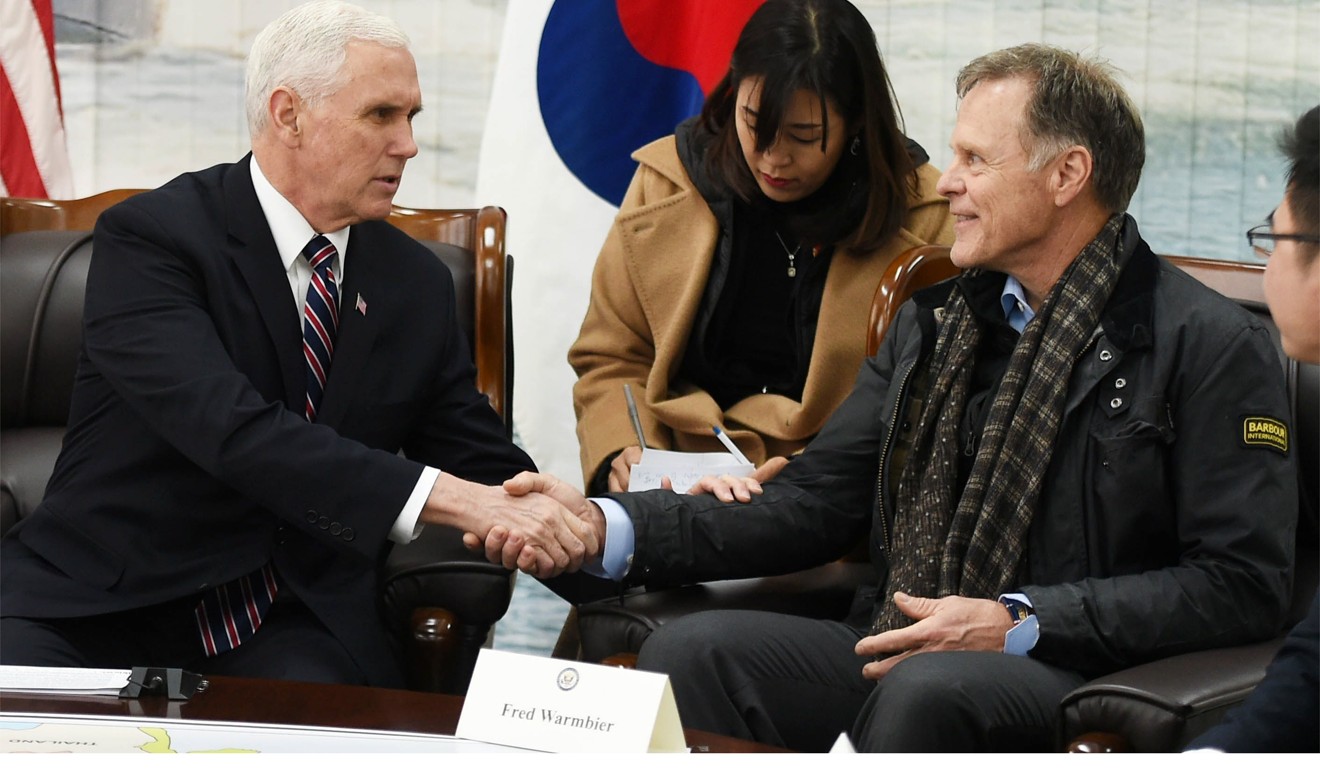Advertisement
Advertisement

SCMP Columnist
Peter Kammerer
Peter Kammerer
The Olympics has never brought peace, and will not bring it to Korea
Peter Kammerer says despite the original aspirations for the Olympics – that athletic ambassadors would promote peace among nations – the games cannot resolve fundamental differences between states like North and South Korea, and are just as likely to inflame nationalistic sentiment
Only a fool would believe the Pyeongchang Winter Olympic Games will make North Korea less troublesome. The two Koreas have now marched 10 times at sporting events under a joint flag and are no nearer to peace. The closing ceremony will take place and sniping will resume, because the games are as much about sports as political point-scoring.
We’ve seen hopes for peace and harmony dashed throughout the 122-year history of the modern Olympics. The 1916 and 1940 games were cancelled due to war, Palestinian terrorists killed 11 Israeli athletes in Munich in 1972, the United States and its allies boycotted the 1980 Moscow Games while the Soviet Union and its allies, including North Korea, returned the favour in 1984 in Los Angeles. A bomb left two people dead and injured more than 100 in Atlanta in 1996. Beyond the two world wars and the Japanese invasion of Asia, there have been scores of conflicts in the Koreas, Vietnam, Iraq, the Balkans, Afghanistan, Syria and Yemen.
Olympic movement founder Pierre de Coubertin envisaged the games leading to a healthier, happier, more peaceful world. He saw sportspeople as peace ambassadors (though he asserted that women should not take part as the sport they played was “impractical, uninteresting, unathletic and incorrect”). The bloody conflicts leading to the creation of Germany and Italy spurred in late-19th century Europe a peace movement embracing the French educator’s words: “Wars break out because nations misunderstand each other. We shall not have peace until prejudices ... shall have been outlived. To attain this end, what better means than to bring the youth of all countries periodically together for amicable trials of muscular strength and agility?”
But the peace sought by setting up the International Olympic Committee in 1894 never took root and, arguably, the games worsened rivalries, stoking patriotism and nationalism.
Political tension threatens to take the spotlight from South Korea’s ‘Peace Olympics’
Korea’s ‘commie’ Moon: The real winner of the Winter Olympics?
The idea for the Olympics came from the games of ancient Greece. Every four years for 12 centuries, a month-long truce was called to a seemingly endless cycle of conflict between city states to enable warriors to take part in a festival of athletics.
The two Koreas have now marched 10 times at sporting events under a joint flag and are no nearer to peace
North and South Korea have embraced the idea with their agreement for Pyeongchang. Military war games between the South and the US have been suspended during the Olympics and the North presumably promised not to test nuclear bombs or intercontinental ballistic missiles.
North Korean leader Kim Jong-un’s vastly more photogenic sister, Kim Yo-jong, made history by being the first member of the ruling dynasty to visit the South since the Korean war. She relayed to South Korean President Moon Jae-in during one meeting an invitation from her brother for a summit; the right conditions have to be created for that to take place. The South’s military ally, the US, will play a major role in such a decision and, for now, it is reluctant. US Vice-President Mike Pence showed up with the father of Otto Warmbier, the US student North Korea jailed for stealing a propaganda banner, and who returned to the US in a coma in June and died just days later.
A pause for reflection is necessary, given how Pyongyang marked the 70th anniversary of its military with a parade the day before the opening ceremony, rather than in April, as has happened in previous years. The decision to field a joint Korean women’s ice hockey team also caused a stir in the South, with some of its team members dropped to make way for less-qualified ones from the North.
How the long road to a unified Korean Olympic team began in Hong Kong

US defence chief Jim Mattis questions Koreas’ warming ties at Pyeongchang Olympics
Behind all is the nuclear issue, which will not be resolved by inter-Korean talks; there is no possibility that what has taken the North so much to develop will now be given up. It’s a pessimistic outlook for Pyeongchang, but a realistic one given what has gone before. Just as in the ancient Greek states, when the games are over, the threats will return.
Peter Kammerer is a senior writer at the Post
This article appeared in the South China Morning Post print edition as: The Olympics has never brought peace

Post
